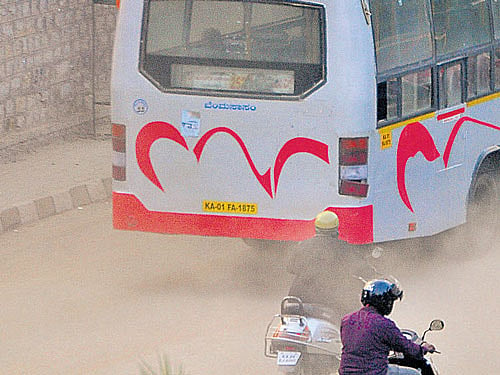
The Bangalore Metropolitan Transport Corporation (BMTC) is in a way an “official polluter” on the City’s roads, said its Chief Mechanical Engineer, B Mukkanna.
BMTC buses release unburnt fuel and carbon dioxide, which is the black smoke. But switching to biofuel or electric buses is a costly affair for the corporation, he told Deccan Herald on the sidelines of a dialogue on ‘Air Quality and Transportation Challenge: An Agenda for Action’ organised by the Centre for Science and Environment (CSE) here on Friday.
Still, he said, the BMTC can cut down the emissions if the government can provide it biofuel at a rate lower than diesel. If biofuel is provided, all buses, except Volvo, will switch over immediately. Even the depots for this are available.
Similar is the case of electric buses. If the cost is reduced from the present Rs 2.5 crore per bus, then passengers will not have to bear the cost, Mukkanna explained.
The BMTC had introduced an electric bus on a trial basis from February 28, 2014, to May 31, 2015, which carried 20,250 passengers and consumed 23,598 units of power.
But more such buses could not be run because of the cost. Five buses that were run on biofuel were phased out for similar reason.
To follow the Central government’s mandate on having at least 20 per cent of biofuel buses, fuel companies have called for tenders for biofuel, he added.
Anumita Roychowdhury, Executive Director, CSE, said the BMTC was using the dust-dousing approach, under which pollutants were sprayed with urea to reduce NOx (nitrous oxide). But the particulate trap mechanism is lacking in the BMTC buses and all transport vehicles.
Need for switch
Not only this, vehicles also need to switch over from 50 ppm sulphur diesel to 10 ppm sulphur diesel which could drastically reduce the pollution levels. This is what the courts have noted, too.
There is also a need to strictly implement Euro 6 emissions standards. But on the ground, the most resistance is from diesel companies, trucks and polluting buses which do not even comply with BS-2 standards, she added.
Increasing cases
Dr H Paramesh, Director and Pediatric Pulmonologist, Lakeside Medical Centre and Hospital, pointed out that 26.95 per cent children aged below 18 had asthma and such cases were increasing every year.
At this rate, by 2016, the number of people suffering from asthma and chronic breathing diseases will increase faster than cancer, skin ailments and strokes.
